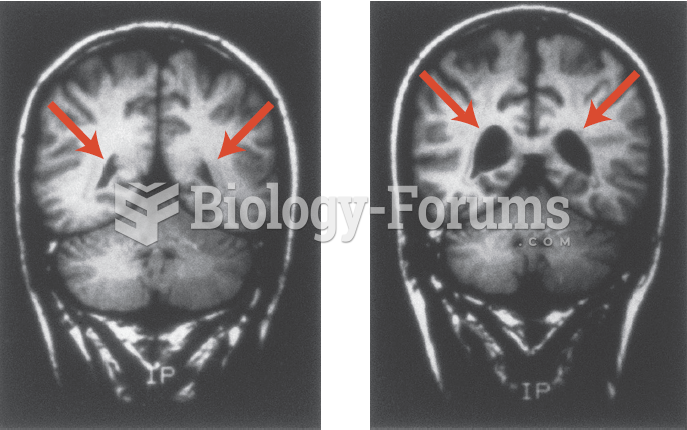Answer to Question 1
A comprehensive treatment program would include antipsychotic medications (neuroleptics), psychosocial therapy, and skills training for both the individual and the family. It is quite clear that neuroleptics are effective in reducing symptoms in a large proportion of individuals with schizophrenia. Excessively high doses of these drugs can cause serious side effects and, over long periods of time, the involuntary movements of tardive dyskinesia. For these reasons, a comprehensive treatment approach should monitor drug dosage so that it is at the lowest level while still controlling symptoms.
At the same time, psychosocial therapies should be used to help individuals with schizophrenia gain control of their lives. Milieu therapy in hospital environments provides training in decision making and planning that schizophrenic patients need. Cognitive-behavioral treatments teach necessary coping and social skills. Cognitive-behavioral treatment of schizophrenia often includes the following steps: engagement, assessment, identification of negative beliefs, normalization, collaborative analysis of symptoms, and developing alternative explanations. Mindfulness training teaches patients to let go of angry or fearful responses to psychotic symptoms and let the psychotic symptoms come into consciousness without reacting. This process enhances feelings of self-control and significantly reduces negative emotions. Integrated Psychological Therapy, a highly effective therapy, helps patients identify their cognitive deficits and provides skills to overcome them.
However, since more than half of recovering patients return to live with their parents, treatment must extend to training in family communicationways to reduce expressed emotion. Therapies that provide information to families about the nature of schizophrenia and methods of communicating without expressed emotion have greatly reduced relapse rates. Individuals with schizophrenia also need to learn coping skills so that they can identify and respond appropriately when family members become emotional. In sum, treatment should combine low but effective levels of medication, psychosocial and cognitive-behavior training, and family interventions designed to reduce relapse. Family and social skills training has proved to be more effective in preventing relapse than drug treatment alone.
Answer to Question 2
The typical course of schizophrenia consists of three phases: prodromal, active, and residual. The prodromal phase includes the onset and buildup of schizophrenic symptoms. During this phase, social withdrawal and isolation, peculiar behaviors, inappropriate affect, poor communication patterns, and neglect of personal grooming may become evident. Often, psychosocial stressors or excessive demands on an individual with schizophrenia in the prodromal phase result in the onset of prominent psychotic symptoms, and the person transitions into the active phase of schizophrenia. In this phase, the person shows full-blown symptoms of schizophrenia, including severe disturbances in thinking, deterioration in social relationships, and flat or markedly inappropriate affect. At some later time, the person may enter the residual phase, in which the symptoms are no longer prominent. In the residual phase, the symptom severity declines, and the individual may show milder impairment similar to that seen in the prodromal phase.
Most people with schizophrenia recover gradually rather than suddenly. Long-term studies have shown that many people with schizophrenia can lead productive lives; however, full recovery is rare. Specifically, research conducted by Harrow et al. (2005) indicated over 40 percent of individuals diagnosed with schizophrenia showed one or more periods of recovery, and a sizable minority was not on any medication. Another study conducted by Wiersma and colleagues (1998) identified 25 percent of individuals diagnosed with schizophrenia in complete remission of symptoms, another 50 percent showed partial remission of symptoms accompanied by either anxiety and depression or negative symptoms, and 11 percent showed no recovery after the initial psychotic episode. Relapses however, also occurred in two-thirds of this sample, after which about one in six showed no remission of symptoms.
Regarding prognosis, there are factors associated with a positive outcome. Being female, married, having a higher premorbid level of functioning, and having a better educational background are associated with better outcomes. Research indicates that baseline predictors associated with recovery from schizophrenia include fewer negative symptoms; a prior history of good work performance and ability to live independently; and lower levels of depression and aggression (Shrivastava, Shah, Johnston, Stitt & Thakar, 2010). Social factors such as peer support/friends, work opportunities, being single or married as opposed to be separated, and reducing the stigma of schizophrenia also play an important role in the recovery process.
Early intervention and reduction of positive symptoms have shown to yield a more favorable course of the illness (Mihalopoulos, Harris, Henry, Harrigan & McGorry, 2009). Interventions to decrease stress from issues such as self-stigmatization, negative beliefs, and social skills deficits can significantly enhance recovery (Tsang et al., 2010).







